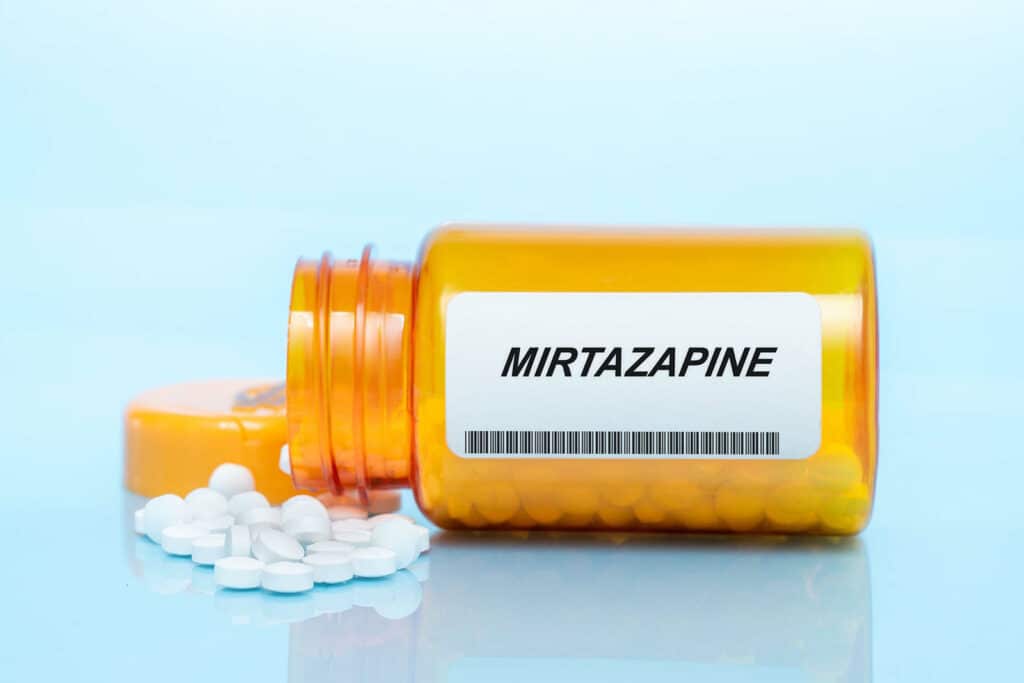If you or someone you know suffers from anxiety or depression, you may have come across a drug called Remeron or another medication with the same active ingredient; mirtazapine.
In today’s guide, we’re taking a comprehensive look at Remeron (Mirtazapine), from its composition and action to its side effects and potential abuse.

Table of Contents
What Is Remeron?
Remeron is the brand name of mirtazapine; an atypical tetracyclic antidepressant. It works by boosting the activity of serotonin and noradrenaline (mood-enhancing chemicals) in the brain.
Mirtazapine was mainly intended to treat major depression, but it was found to be beneficial in treating various mental and psychological disorders such as anxiety, OCD (obsessive-compulsive disorder), sleep apnea, insomnia, and panic attacks (panic disorder).
Some off-label uses also include appetite stimulation and drug addiction treatment.
How Do You Take Remeron?
The doctor will specify an appropriate mirtazapine dose depending on each patient’s case. That said, the average dosage is as follows:
| Adults | Children |
| 15 m once daily. The dose per day shouldn’t exceed 45 mg; three 15 mg tablets a day. | Dose and frequency are determined by the doctor. |
How Much Mirtazapine Should I Take for Sleep?
For sleep problems, mirtazapine is typically prescribed at a lower dose of 3.75 or 7.5 mg at bedtime.
What if You Miss a Dose of Mirtazapine?
You may forget to take a dose of mirtazapine.
If this happens, take your usual dose as soon as possible unless it’s almost time for the next dose. In the latter case, don’t take the missed dose and just follow your normal dosing schedule.
Never take double the dose to make up for a missed dose.

Are there Side Effects To Taking Remeron?
Patients can experience improved mood, elevated energy levels, enhanced sleep cycles, and more intense feelings of well-being after taking Remeron and other mirtazapine medications.
Mirtazapine is considered generally safe for the long term. However, they may also experience negative and potentially dangerous adverse effects ranging from mild to severe.
Examples include the following:
- Increased appetite
- Weight gain
- Nausea
- Sleepiness
- Dizziness
- Drowsiness
- Confusion and trouble concentrating
- Body aches
- Headaches
- Constipation
- Diarrhea
- Abdominapaibai
- Weird dreams
Behavioral changes, an increase in depression, and suicidal tendencies are some of the more serious side effects of mirtazapine. These usually appear during early periods of treatment.
Additional documented side effects include elevated agitation, anxiety, hostility, irritability, and panic attacks.
Since mirtazapine increases serotonin levels in the brain, there’s a chance it can cause serotonin syndrome in some individuals.
This syndrome happens due to too much serotonin and manifests in mild symptoms (like diarrhea and shivering) or severe symptoms (like fever, muscle rigidity, and seizures).
How Not to Gain Weight on Mirtazapine
The side effects of Remeron for appetite increase and weight gain are usually ones that patients want to avoid.
These side effects are inevitable for some patients, but most can minimize weight gain on mirtazapine by following the guidelines below:
- Stick to a healthy, balanced diet containing vegetables, lean protein, fiber, low-fat dairy items, and whole grains.
- Keep in mind mirtazapine foods to avoid or reduce (junk food, high-fat foods, high-sugar foods).
- Drink water regularly.
- Measure food portions.
- Get enough physical activity.

What Are the Dangers of Taking Remeron?
Besides the potential side effects of mirtazapine, there’s also the possibility of abuse, addiction, and overdose.
Abuse
Mirtazapine doesn’t produce a high like most abused drugs, but its mood-elevating and calming effects are appealing to many users.
They either take it without a prescription or take more of the drug than the doctor prescribed.
Some users take mirtazapine to reverse the effects of cocaine and other stimulant drugs. This sort of Remeron abuse can lead to serious complications such as abdominal pain, altered cognitive function, and convulsions.
Addiction
Addiction is both a physical and behavioral reaction. It’s also a chronic, treatable medical disease according to the American Society of Addiction Medicine.
Although mirtazapine is generally considered safe and nonaddictive, it can lead to physical dependency. This happens when people who take the drug experience unpleasant withdrawal symptoms once they try to stop it or reduce the dose.
The withdrawal symptoms include headaches, vomiting, dizziness, irritability, rebound depression, nightmares, and tingling/prickling of the skin.
To avoid the unnerving effects of withdrawal, a cycle of dependence and addiction starts as the user builds up a tolerance and takes higher and higher doses of the drug.
Signs of Addiction
The most obvious indication of mirtazapine addiction is when the person loses control over their use of the drug.
Other signs that a user developed an addiction include the following:
- The user is unable to stop taking the drug.
- The user shows sudden changes in behavior, hygiene, and appearance.
- The user requires a higher and higher dose of the drug to get the same effects.
- The user continues to take the drug for longer than prescribed by the doctor or after the treatment period is over.
- The user fakes symptoms to obtain mirtazapine prescriptions.
- The user obsesses over the use, effect, and possible sources of the drug.
Overdose
When a user takes too much mirtazapine that their body can’t efficiently metabolize and expel, an overdose occurs with negative effects on certain body functions.
Symptoms of Remeron overdose usually start with:
- Hallucinations
- Chest pain
- Slurred speech
- Vomiting
- Breathing difficulties
- Increased heart rate
- Intense drowsiness
Examples of the more severe symptoms are extreme hypotension (low blood pressure), seizures, and cardiac arrest. In some cases, mirtazapine overdose can lead to extreme adverse effects like respiratory failure and death.
Overdosing on mirtazapine is a much higher risk when the drug is mixed with benzodiazepines or alcohol.

Can Remeron Cause Withdrawal Symptoms?
Yes, mirtazapine can result in unpleasant withdrawal symptoms. These happen when the drug suddenly leaves the bloodstream.
Symptoms of Remeron withdrawal include headaches, vomiting, dizziness, irritability, rebound depression, nightmares, shaking, and tingling/prickling of the skin.
To minimize the occurrence of mirtazapine withdrawal symptoms, the doctor will gradually lower the dose over several weeks (or more time depending on how long you’ve been taking it) instead of suddenly stopping the drug.

Get Help for Yourself or a Loved One
It’s possible to treat mirtazapine abuse and addiction with a combination of comprehensive medical detox and addiction treatment.
Please contact Recreate Life Counseling for additional information about Remeron Addiction Treatment near you.
FAQ
How much mirtazapine should i take for sleep?
How not to gain weight on mirtazapine?
What are some foods to avoid while taking mirtazapine?



